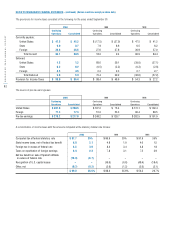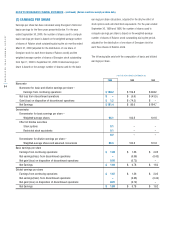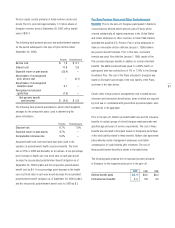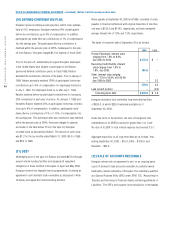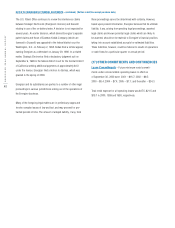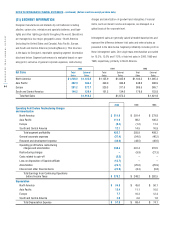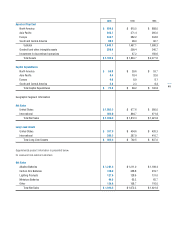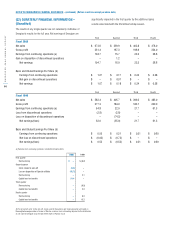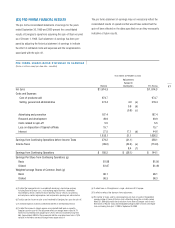Energizer 2000 Annual Report Download - page 43
Download and view the complete annual report
Please find page 43 of the 2000 Energizer annual report below. You can navigate through the pages in the report by either clicking on the pages listed below, or by using the keyword search tool below to find specific information within the annual report.
41
payment of $2.4 and $2.7 to counterparties for outstanding foreign
currency contracts at September 30, 2000 and 1999, respectively.
However, these payments are unlikely due to the fact that Energizer
enters into foreign currency contracts to hedge identifiable foreign
currency exposures, and as such would generally not terminate
such contracts.
(16) ENVIRONMENTAL AND LEGAL MATTERS
Government Regulations and Environmental Matters
– The
operations of Energizer, like those of other companies engaged in the
battery business, are subject to various federal, state, foreign and
local laws and regulations intended to protect the public health and
the environment. These regulations primarily relate to worker safety,
air and water quality, underground fuel storage tanks, and waste
handling and disposal.
Energizer has received notices from the U.S. Environmental
Protection Agency, state agencies and/or private parties seeking
contribution, that it has been identified as a “potentially responsible
party” (PRP) under the Comprehensive Environmental Response,
Compensation and Liability Act and may be required to share in
the cost of cleanup with respect to nine federal “Superfund” sites.
It may also be required to share in the cost of cleanup with respect
to a state-designated site. Liability under the applicable federal and
state statutes which mandate cleanup is strict, meaning that liability
may attach regardless of lack of fault, and joint and several, meaning
that a liable party may be responsible for all of the costs incurred
in investigating and cleaning up contamination at a site. However,
liability in such matters is typically shared by all of the financially
viable responsible parties.
The amount of Energizer’s ultimate liability in connection with those
sites may depend on many factors, including the volume and toxicity
of material contributed to the site, the number of other PRPs and
their financial viability, and the remediation methods and technology
to be used.
In addition, Energizer undertook certain programs to reduce or
eliminate the environmental contamination at the rechargeable bat-
tery facility in Gainesville, Florida, which was divested in November
1999. In the event that the buyer would become unable to continue
such programs, Energizer could be required to bear financial
responsibility for such programs as well as for other known and
unknown environmental conditions at the site.
Many European countries, as well as the European Union, have been
very active in adopting and enforcing environmental regulations. In
many developing countries in which Energizer operates, there has
not been significant governmental regulation relating to the environ-
ment, occupational safety, employment practices or other business
matters routinely regulated in the United States. As such economies
develop, it is possible that new regulations may increase the risk
and expense of doing business in such countries.
It is difficult to quantify with certainty the potential financial impact
of actions regarding expenditures for environmental matters, particu-
larly remediation, and future capital expenditures for environmental
control equipment. Nevertheless, based upon the information
currently available, Energizer believes that its ultimate liability
arising from such environmental matters, taking into account
established accruals of $3.6 for estimated liabilities, should not
be material to its financial position. Such liability could, however,
be material to results of operations or cash flows for a particular
quarter or annual period.
Legal Proceedings
– On April 8, 1998, Zinc Products Company,
a division of Alltrista Corp., a supplier of zinc cans used in the man-
ufacture of batteries, filed suit in federal district court for the Eastern
District of Tennessee against Energizer, claiming breach of contract
when Energizer closed its Fremont, Ohio plant. The plaintiff claims
lost profits and other damages of approximately $2.8. The case has
been set for trial in January 2001.



